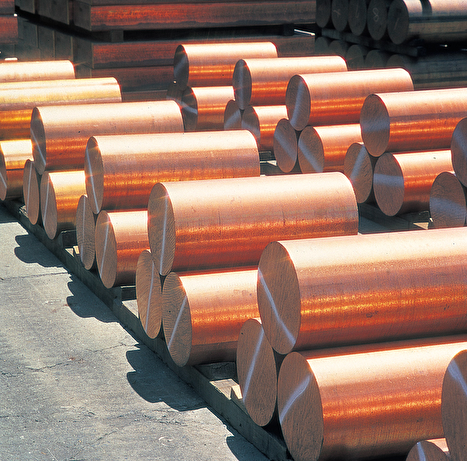Exactly How Copper Products Contribute to Lasting Practices in Different Industries
In renewable power systems, for example, copper improves the functionality of solar and wind innovations, while its application in construction lessens waste through longevity. As sectors look for to embrace even more sustainable practices, the duty of copper might verify pivotal in attaining environmental objectives.
Copper in Renewable Resource
Copper plays an important role in the development of renewable resource innovations, functioning as an essential conductor in different applications. Its extraordinary electrical conductivity and resistance to rust make it a suitable product for electrical wiring, which is important in photovoltaic panels, wind generators, and energy storage space systems. In solar photovoltaic systems, copper is utilized in the interconnections and wiring, allowing effective energy conversion from sunlight to electrical power.
In wind power, copper is important to the generators and transformers that convert kinetic energy right into electric power, making certain optimal performance and integrity. In addition, the need for electrical automobiles (EVs) is enhancing, with copper being a key element in batteries, motors, and charging framework. The change to EVs significantly improves the need for copper, as these lorries usually make use of 4 times a lot more copper than standard interior combustion engine automobiles.
As the world seeks to minimize environment adjustment and change to sustainable energy sources, copper's role ends up being increasingly crucial. The product not only improves the performance and resilience of renewable resource systems yet also sustains the broader goal of reducing greenhouse gas exhausts and promoting a lasting future.
Eco-Friendly Building And Construction Products
In recent times, there has actually been a noteworthy change towards the fostering of environmentally friendly building products in response to growing ecological worries. This change is motivated by the requirement for sustainable choices that reduce eco-friendly footprints while preserving architectural integrity and aesthetic charm.
Copper, known for its longevity and recyclability, has actually become a vital gamer in this industry. It can be used in roofing, pipes, and electric systems, contributing to power efficiency and decreasing waste. Copper's durability means fewer replacements gradually, more enhancing its sustainability profile.
In addition, products such as bamboo, redeemed timber, and reused steel are acquiring popularity. These options not only supply minimized ecological influence but also advertise source preservation. As constructing codes increasingly emphasize sustainability, builders and designers are incorporating these products into their tasks, cultivating innovation in design.
The increasing adoption of green construction products mirrors a wider commitment to sustainability in the built atmosphere. By prioritizing these materials, the building market can substantially minimize its carbon impact, align with regulative criteria, and support a much healthier community for future generations. This pattern marks a pivotal step in the direction of an extra sustainable future in construction.
Copper's Duty in Healthcare
Recent studies have highlighted the considerable function of copper in health care settings, specifically due to its antimicrobial properties. Copper surfaces have actually been shown to minimize the presence of microorganisms, consisting of viruses and germs, by up to 99.9% within a short duration. This impressive effectiveness makes copper an important material for high-touch surfaces in health centers, such as doorknobs, bed rails, and IV poles, therefore adding to enhanced infection control measures.
In enhancement to its straight antimicrobial effects, copper likewise contributes in the broader context of hospital sustainability (Copper Products). By integrating copper right into medical equipment and home furnishings, health care facilities can decrease the occurrence of healthcare-associated infections (HAIs), which not just boosts patient end results but also reduces the expenses related to prolonged medical facility stays and additional treatments
In addition, copper's resilience and recyclability line up with lasting techniques, enabling responsible source monitoring. As healthcare systems significantly focus on both individual safety and environmental stewardship, the integration of copper items is coming to be extra common. This double advantage emphasizes copper's vital payment to a healthier, safer, and much more lasting health care atmosphere.
Sustainability in Transport

In addition, copper's resilience and deterioration resistance add to the longevity of transportation infrastructure (Copper Products). In rail systems, as an example, copper elements improve the dependability and effectiveness of signaling and power systems, essential my company for decreasing hold-ups and power consumption. Furthermore, copper's function in sustainable power systems, such as solar and wind, supports sustainable transport solutions by offering clean energy for electric transit alternatives
Investments in copper technology not just foster sustainability yet additionally boost financial growth and task development in green sectors. As sectors make every effort to satisfy rigorous environmental policies, the application of copper items in transportation becomes an essential technique in achieving sustainability goals and promoting a cleaner, more effective future.
Copper and Circular Economic Climate
As the globe significantly embraces sustainability, the role of copper in the round economic situation becomes ever a lot more considerable. Copper's find more inherent residential properties-- such as its conductivity, recyclability, and sturdiness-- placement it as a crucial material in a resource-efficient economic climate. The round economy aims to lessen waste and take full advantage of source usage with recycling and reusing materials, and copper excels in this regard.
The steel can be reused indefinitely without loss of top quality, making it an ideal prospect for sustainable methods throughout numerous industries, consisting of building, electronics, and eco-friendly power. By reprocessing and recovering copper from end-of-life products, industries can considerably lower the requirement for virgin materials, consequently decreasing environmental influences related to mining and processing.
Furthermore, the integration of copper right into round economic climate frameworks not just conserves sources but also promotes technology. Services that focus on copper recycling add to a much more sustainable supply chain, enhancing their competition while straightening with regulative demands and customer choices for environmentally liable items.
Verdict
Finally, copper items significantly add to sustainable techniques across several fields. Their important role in improving renewable resource innovations, advertising green building materials, supporting infection control in medical care, promoting sustainable transportation, and embodying the concepts of a round economic situation underscores the convenience and importance of copper. By integrating copper into numerous applications, industries can accomplish higher efficiency, decrease environmental influence, and line up with international sustainability objectives, ultimately promoting an extra sustainable future.

Copper's exceptional conductivity makes it a favored product in electric automobile (EV) systems, improving power performance and performance. In addition, copper's role in sustainable power systems, such as solar and wind, sustains sustainable transportation remedies by giving clean energy for electric transit alternatives.
Their visit homepage important duty in improving renewable energy technologies, advertising green construction materials, supporting infection control in healthcare, facilitating lasting transport, and embodying the concepts of a round economy highlights the convenience and importance of copper.